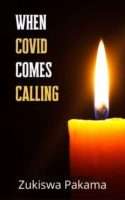So here we are everyone, over a year later, coping with the third wave of the covid-19 corona virus! As When Covid Comes Calling shows, this disease has changed life as we know it. That’s because it is very contagious, meaning it spreads from person to person easily.
If one person in a home has it, everyone else may get it. This worsens the trauma of a family member dying. In the story, Ayola is dealing with her mother’s death and feeling very, very sick in hospital. And grieving Mpumezo and Khulu have to wait, then test negative, before they can come into any contact with other people.
Covid-19 is so contagious that when we are in a ‘wave’ of infection, even our most serious, profound, emotional, human ritual has to be drastically changed: a funeral.
As Ondela knows, “Now, because of the pandemic and the strict orders from the authorities, people are warned to shun funerals because it’s where most people are infected. … I fully agree with that. People should try by all means to protect themselves.”
Worldwide, funerals have been examples of the new phrase: a ‘super-spreader event’. The virus comes from our lungs in minute droplets into the air. Loud talking, praying, and singing makes the ‘viral load’ in the air greater. This is especially so indoors, like in a church or mosque (or shebeen or nightclub etc).
Ondela understands the scientific facts and supports the lockdown rules. But we feel his emotional pain when he says, “But wait until this happens to your family! The pain seems to be doubled by the absence of mourners. The absence of people who come by and say, ‘Ondela, we are with you in this. We have come to share your pain.’ Instead, the pandemic has made us like aliens to each other.
Normally a funeral is time when the extended family and friends gather to help and to console each other. People also have important cultural and religious rituals to perform. But under covid, Mariza’s brother George is too scared to come – despite being allowed to. We understand Ondela’s anguish when he says, “I need you. You are my blood. At least you will be allowed to come!”
Uncle George is a selfish, self-interested man, but he does have a point when he says, “In times like these one has to forget about old customs and rituals that we do during funerals.”
Khulu too is sad, saying, “The corona has changed everything. It has turned people against each other. It has demolished the spirit of ubuntu in our families, in our communities!”
Both she and Ondela have felt the sting of stigma against them due to the virus, to the point where people won’t come near them, and refuse to help with the funeral. At least Mpumezo is prepared to take the precautions (mask, sanitizer, social distancing, ventilation) and help out.
Even important things like making sure the right body is being buried, and having the chance to say a last goodbye has been stopped under covid. Khulu is afraid: “It’s not our culture not to see a person for the last time. What if that angers her?” Khulu’s eyes were full of sadness, and I could see a bit of fear there as well.
Even the comforting beauty of the hymns and prayers is stopped, the healing hugs and close presence of others. A funeral has become brief and cold, not nearly enough for us to share our grief, feel consoled, and release our feelings.
However, the story also shows us how human inventiveness can help us lessen this problem. Mpumezo organizes for the funeral to be live-streamed from his phone. This means that far-flung people trapped under lockdown can attend, virtually. Maybe this new part of funerals will become permanent?
And it is a wonderful high point of the story when this happens:
“We had totally forgotten about the drive-by in honour of my mom that had been planned by the nurses! … As we watched, the cars drove slowly by, people waving to us. All the nurses were in their work uniforms; it was such a beautiful spectacle to be hold. Some would get out briefly and drop a bouquet of flowers and a card. Some dropped envelopes of money on the prepared table.”
This is an opportunity to stress how tough this pandemic has been on health care workers, like Ondela’s mother.
These workers – including staff such as porters and cleaners – have had a high rate of infection and death. They have to wear uncomfortable PPE at all times. They are overwhelmed with covid cases at the peak of each wave. Their jobs become nightmarish! Added to this is the trauma of many, many patients dying in a short space of time in their ICU units. They die all alone, unable to have family members visit, or even be at their death-beds.
For the sake of health care workers, of people with co-morbidities like Ayola (bad asthma) and Khulu (being older) it is our responsibility to all get vaccinated as soon as we can. Plus, never forget that this disease can affect anyone severely. Healthy people can be attacked – like Mariza. And we now know that many people remain sick for months and months, with what is called ‘long covid’.
Vaccination is the only sure way we can stop this virus coming in wave after wave. It either prevents infection, or makes the illness much less dangerous. Vaccination is even more important as new variants of the virus are brought by people into South Africa. The new types of covid are proving to be even more contagious. Thank goodness our health care workers are now vaccinated.
To end, we should note the words of Ondela about the funeral, and Mariza’s spirit, which are surely true: “We will be fine, Khulu. We will be fine. If she is indeed in the world of spirits, she will understand. She will know why things are done differently right now.”
***
Tell us: Have you been to a funeral that was very different due to covid? How was it different?





